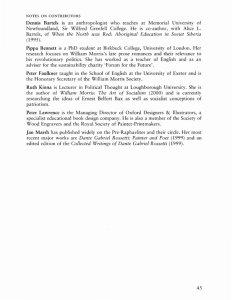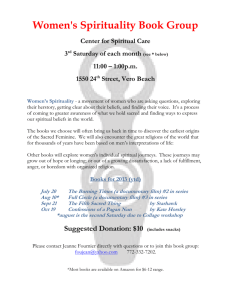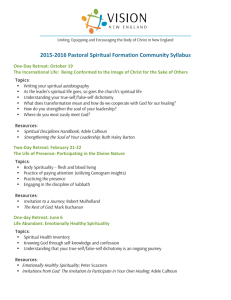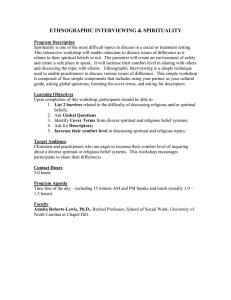Document 11102915
advertisement
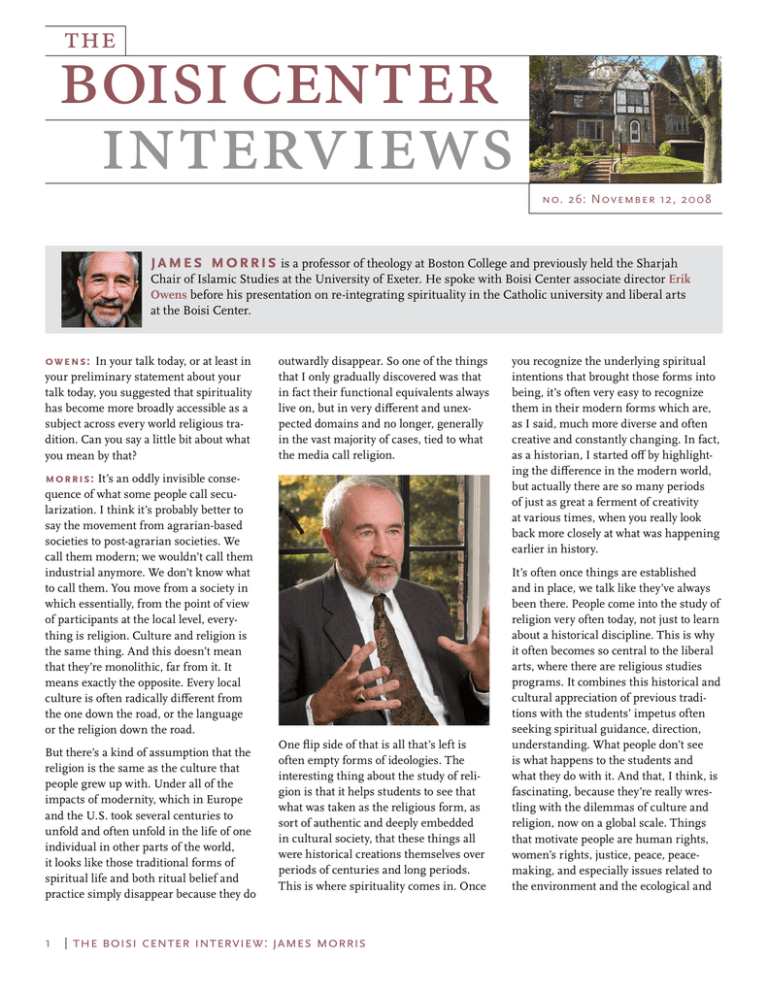
the boisi center interviews no. 26: November 12, 20 0 8 james morris is a professor of theology at Boston College and previously held the Sharjah Chair of Islamic Studies at the University of Exeter. He spoke with Boisi Center associate director Erik Owens before his presentation on re-integrating spirituality in the Catholic university and liberal arts at the Boisi Center. owens: In your talk today, or at least in your preliminary statement about your talk today, you suggested that spirituality has become more broadly accessible as a subject across every world religious tradition. Can you say a little bit about what you mean by that? outwardly disappear. So one of the things that I only gradually discovered was that in fact their functional equivalents always live on, but in very different and unexpected domains and no longer, generally in the vast majority of cases, tied to what the media call religion. morris: It’s an oddly invisible consequence of what some people call secularization. I think it’s probably better to say the movement from agrarian-based societies to post-agrarian societies. We call them modern; we wouldn’t call them industrial anymore. We don’t know what to call them. You move from a society in which essentially, from the point of view of participants at the local level, everything is religion. Culture and religion is the same thing. And this doesn’t mean that they’re monolithic, far from it. It means exactly the opposite. Every local culture is often radically different from the one down the road, or the language or the religion down the road. But there’s a kind of assumption that the religion is the same as the culture that people grew up with. Under all of the impacts of modernity, which in Europe and the U.S. took several centuries to unfold and often unfold in the life of one individual in other parts of the world, it looks like those traditional forms of spiritual life and both ritual belief and practice simply disappear because they do 1 One flip side of that is all that’s left is often empty forms of ideologies. The interesting thing about the study of religion is that it helps students to see that what was taken as the religious form, as sort of authentic and deeply embedded in cultural society, that these things all were historical creations themselves over periods of centuries and long periods. This is where spirituality comes in. Once the boisi center interview: james morris you recognize the underlying spiritual intentions that brought those forms into being, it’s often very easy to recognize them in their modern forms which are, as I said, much more diverse and often creative and constantly changing. In fact, as a historian, I started off by highlighting the difference in the modern world, but actually there are so many periods of just as great a ferment of creativity at various times, when you really look back more closely at what was happening earlier in history. It’s often once things are established and in place, we talk like they’ve always been there. People come into the study of religion very often today, not just to learn about a historical discipline. This is why it often becomes so central to the liberal arts, where there are religious studies programs. It combines this historical and cultural appreciation of previous traditions with the students’ impetus often seeking spiritual guidance, direction, understanding. What people don’t see is what happens to the students and what they do with it. And that, I think, is fascinating, because they’re really wrestling with the dilemmas of culture and religion, now on a global scale. Things that motivate people are human rights, women’s rights, justice, peace, peacemaking, and especially issues related to the environment and the ecological and natural world. And all of these have been central elements of that sort of classical, high cultural religion, but today those key contemporary political and ethical issues are generally not seen as a visible part of what the media and modern ideologies normally identify as “religion”. So when we look at what happens to our religious studies students, they tend to go almost entirely into three areas. One is service professions, so they become doctors and psychologists and therapists. Or often it’s political and NGO activism, whether locally or internationally. And the third one is creative arts, an application of the arts to spiritual life. All of these again have their pre-modern equivalents. But basically, it’s rare in my experience that they do any of these three things in what people identify today as an explicitly “religious” framework. But in fact they’re forging the new religious forms of the centuries to come. And also, this all depends on the local politics surrounding religious issues. You were just mentioning the [Fethullah] Gülen movement there, so certainly there are interesting parallels to be teaching in a Catholic university, a self-consciously Catholic university, that are very similar to the dilemmas that most Muslims face in the contemporary world. They grow up in nation states, ostensibly in secular education systems, but want those systems to pay lip service to Islam. So the particular form of the dilemma that Muslims face in those nation state environments mirrors a great deal what people are wrestling with who are Catholic in Catholic educational contexts. owens: I want to come back to the Catholic question in just a minute and your argument about the liberal arts tradition and religious studies, a place of religious studies and spirituality there. If I could circle back and touch onto the question of spirituality as such, as I understand it you were contrasting spirituality with perhaps what you said, a high 2 culture, or perhaps theology, or some intellectualized version, is that it? morris: It’s a lot of things. owens: So if spirituality is a component of religion or religious studies or human existence, what are other categories that help us understand what you’re speaking of exactly? morris: Well, it’s simply what it means to be human. I thought it would be useful to talk about religious studies “I’ve focused on speaking about the ‘Islamic humanities, because the ‘Spirit’ that is their constant focus is what we are as human beings within any of these traditions.” as a discipline because it doesn’t exist officially here, and it’s so important in American education and liberal arts. I’m simply saying it doesn’t exist here as a separate department institutionally. But what struck me more forcefully as I went along in preparing what I was going to talk about was that in reality everybody we’ve heard talking at the Catholic Intellectual Traditions meetings has been actually talking about spirituality in the arts, in theater, in politics, in history and so forth. That is why I’ve focused on speaking about the “Islamic humanities”, the boisi center interview: james morris because the “Spirit” that is their constant focus is what we are as human beings within any of these traditions, and certainly is identified directly as such within three Abrahamic traditions. So it’s not something that can be taught simply in an academic setting. It’s something that people learn, it’s simply about the role of the spirit in their life and how it connects them with other human beings. And of course having said that in that broad a sense, one of the very important things we all have to keep in mind is that people awaken to that spiritual dimension of their lives at different points, and they’re under different pressures. Again, the major religions have always had many sets of rituals and intellectual forms that could capture and channel or help out people as they encountered those spiritual dimensions of their lives often later in life, long after what we think of today as the undergraduate experience. What you find in undergraduate religion departments is that the same type of people who go into them and seek them out: at BC they would go into the honors program, or the great books, or theology, or philosophy... one of the major reasons the study of religion has recently boomed in the American liberal arts is obviously because philosophy departments in so many places committed suicide (i.e., cut themselves off from engagement with earlier Western philosophic traditions): people just said we’ll only do our Anglo-American philosophy of science and language and logic. owens: Analytics. morris: If nothing else is philosophy, then you can almost track as academic philosophy restricted itself to those fields, the study of religion came in as a way to introduce people to the wider philosophic dimensions of the world’s religions. owens: Well, one of your arguments, as I understand it, is that there has been a resurgence of interest in this topic, and technology and globalization has allowed more communication about this. But how do you account for the resurgence of interest in this? morris: Well again, I think it’s a shift of expression. So in traditional times, if somebody were interested in this, they became a nun or a monk or a Sufi or a hasid. They became somebody who specialized in this within a particular culture, within a particular environment. Today, people who still have the same inclinations and the same interests, both in order to practice, fully, their spiritual life, and in particular to communicate and share it to other people. They have to find what the Buddhists call “appropriate means.” And that’s where creativity comes in. I’d love to give concrete illustrations and anecdotes, because as I was saying about our students and graduates that if they’re inclined artistically, they’re not going to end up doing stained glass windows or manuscript illustration, but they’re going to have to find new artistic means to express their still religious devotional art. The forms in which they communicate it and the way they get across their meanings, as well as the wider contexts have all changed. For example, the digital media have suddenly become so important both in communicating about aspects of spiritual practice and experience and in communicating about the wider artistic, ethical, political consequences of that. I felt strange, in fact, mentioning our graduates going into the helping professions or into NGOs, larger political activities or into artistic ones, because in fact most people who graduate today already are doing something of all of those. They make their living in those necessarily creative and changing new contexts. And this has to do with simply the extent of change in the world we live in today—in that creativity used to be something that was severely constrained by the socio-economic realities of the situations in which people lived, even in the 1930s and ‘40s in the U.S. 3 And now, on the contrary, we live in a situation, whether you look at education or ethics or intersection of politics and ethics, where human rights come to the fore—or at the intersection of politics, economics and sciences, in ecology and environment. People are actually being obliged to create new solutions to those problems. You still have to do what you always did, which is you try out something, see if it works. But if it works, you could go from the pilot stage to sharing that and asking other people to try and imitate it very, very rapidly in the world today. In the old days, you had to set up an intentional community whether it be a monastery, or America’s longstanding tradition of Protestant and other little intentional communities. That was a lifetime’s task. But now mom and dad and their two kids and their neighbors can do it: let’s see if we can find a new way of educating our kids that brings in the centrality of nature, spiritual values and all that. And you don’t have to call it anything or whatever, but if it works, that practice catches on pretty quickly and your college friends in Pakistan or Australia or China, well, you let them know about it, and they’ll try it out. So yes, it’s a different world. owens: So is it fair then, just to clarify, there hasn’t been resurgence of spirituality as you defined it – the boisi center interview: james morris morris: A spiritual renewal. owens: Yeah, not in any sense, but rather in new forms in which this can channel, new modalities and new means of communication. morris: Yes, I think I’ve been successful as an undergraduate teacher in these times largely because I’ve had lots of kids of my own. They helped me to stay in touch with this ongoing transformation. For me, I chose the University of Chicago over a lot of other places because they had all these famous people teaching the great books and kind of classical liberal arts, and that was incredibly liberating. I was coming from a farm where I was already in my teens before I even saw a college bookstore. But that’s not the world in which our children and our students grow up today. And I’ve just come from working with a student, a person who’s doing her senior thesis here, who wanted to work on interfaith dialogue. So I suggested that we look at the internet, since there’s not yet a lot of solid research and writing about what’s going on in that field. And it’s just mind-boggling how people everywhere are dealing on the web with all sorts of aspects of communicating, from the most hostile to the most well-intentioned, both about their own faith traditions and in regard to communicating with people from other traditions. And she has what would be a superb book if she had a little more time to finish her thesis and write it, because nobody’s yet begun to grasp the implications of what is happening globally in this domain. owens: Well, that’s another of my questions. I know syncretism is kind of an outdated word these days, but what sorts of results come from this interchange among religious traditions around the world? What are you seeing? morris: What is effective as I see it, as it happens to people, whatever their culture, is that they actually recognize problems or opportunities for creativity. Say somebody is just a natural musician or a natural actor, and they want to develop that creativity in, if you will, divine service or in service to humanity. They’ll go back to a tradition that’s familiar to them or known to them, but they’ll quickly recognize that the study of the traditional forms of that tradition is a lifelong study. That can be useful personally, but if you’re going to communicate what you learn from that study—and it can be spiritual practice, meditation, Ignatian retreats, it can be any of these things. As soon as you turn around now, and you’ve found something that’s important to share here, how are you going to share it? At that point, people are looking for appropriate and effective means of communication. But the essential question is, as I said, one of efficacy—communication and effectiveness. For example, I do have many friends, former students and colleagues, who have taken all sorts of things from Sufism, Buddhism, perhaps other aspects of Christianity as well, and applied them in Jewish renewal contexts. It used to be people would say dismissively that that sort of thing is just American, because you have this unique mass of people working together from different religious backgrounds. My own experience is in the contemporary world, at a level of college education and beyond, 4 this kind have situation has actually become global. Of course there are people who can only speak their own language and can only deal with people of their own culture and religion. But once people all over the world learn English or French, Russian or Chinese, they’re necessarily looking at a wider range of possible solutions to their problems and their situations. Where I’m constantly in touch with this is whenever I’m asked to travel or lecture in places all over the Muslim world. With the British Council’s lecture series after “What we’re obliged to create today isn’t really a new process. It’s cer tainly not about syncretism, it’s simply about f inding appropriate means to communicate to create and ef fec t lasting change.” 9/11, I spent a lot of time in Morocco, Indonesia, Malaysia and Turkey. And when I go there, I’ll be speaking one moment to people at their business school or their school for public officials, the next time to a group of people who are going to be, say, religion teachers or school teachers, and the next day to people who are out in the active business world. They’re all the boisi center interview: james morris interested in knowing more about their own traditions. I’m constantly being obliged, often on the fly, to connect what I’ve learned about the civilization and religious tradition with what they actually want to know and what they want to be able to use for their circumstances. And on the one hand this might sound very new, but in fact there are whole genres of the writings or recordings of Sufi teachers who are actually in the medieval context doing this. Or early Christian monks, fathers of church, who had to create monasteries and what we now call monastic traditions. So they would land among the heathen in, say, Ireland or France or wherever, and they had to come up with forms to communicate to people in those alien cultures what Christ’s teachings were about. So this isn’t really new. Going back in history, it’s clear that what we’re obliged to create today isn’t really a new process. It’s certainly not about syncretism, it’s really simply about finding appropriate means to communicate to create and effect longer-term, lasting change. Can I just give one concrete example? Look at how parents learn to parent today. It used to be that one looked to grandma or grandad or your mother-in-law, but now you walk into bookstores, you turn on your TV, or go on the internet and there’s just such a diversity of different sources and perspectives. And the problem is to make sense of all that information. How do we make sense of all that? So I think education today, to bring us back to education and liberal arts, it’s about giving people the tools they need to exercise judgment and creativity responsibly in this world where we’re all faced unavoidably with this plurality of cultures and religious traditions. [end] The Boisi Center for Religion and American Public Life Boston College 2 4 Quinc y Road Chestnut Hill, MA 02 467 tel 617 - 55 2-1860 f a x 617 - 55 2-1863 publife@b c .e du Visit bc .e du/boisi-resources for a complete set of the Boisi Center Inter views and audio, video, photographs, and transcripts from our events. 5 the boisi center interview: james morris b oisicenter @b oisi _ center




